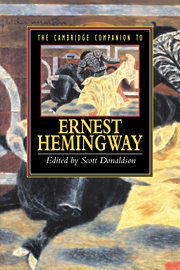Book contents
- Frontmatter
- 1 Introduction
- 2 Hemingway's journalism and the realist dilemma
- 3 1924
- 4 In Our Time, out of season
- 5 Brett and the other women in The Sun Also Rises
- 6 A Farewell to Arms
- 7 Hemingway's late fiction
- 8 Hemingway and politics
- 9 Hemingway and gender history
- 10 Hemingway, Hadley, and Paris
- 11 Hemingway's Spanish sensibility
- 12 The Cuban context of The Old Man and the Sea
- 13 Conclusion
- Selected Bibliography
- Index
- Series List
3 - 1924
Hemingway's luggage and the miraculous year
Published online by Cambridge University Press: 28 May 2006
- Frontmatter
- 1 Introduction
- 2 Hemingway's journalism and the realist dilemma
- 3 1924
- 4 In Our Time, out of season
- 5 Brett and the other women in The Sun Also Rises
- 6 A Farewell to Arms
- 7 Hemingway's late fiction
- 8 Hemingway and politics
- 9 Hemingway and gender history
- 10 Hemingway, Hadley, and Paris
- 11 Hemingway's Spanish sensibility
- 12 The Cuban context of The Old Man and the Sea
- 13 Conclusion
- Selected Bibliography
- Index
- Series List
Summary
For someone who traveled as long and far as Ernest Hemingway did, it is little wonder that his luggage - a trunk stored in the family attic, a valise stolen at a railway station, another trunk left for decades at a hotel - might become metaphors for his life; and it is less wonder that their contents, known or suspected, would be curiously examined at the borders of Hemingway criticism. I will inspect two of them here: the trunk holding boxes of early papers stored in Oak Park just before Ernest and Hadley sailed for Paris in December 1921, and the valise of manuscripts stolen from Hadley at the Gare de Lyon as she was on her way to join Ernest in Lausanne in December 1922.
The first set of Chicago manuscripts was returned to Hemingway by several editors of popular magazines as not worth publishing; and the second set, not worth stealing, was probably dropped into a Paris sewer by a disgruntled thief. By 1924 both the rejection of the first and the theft of the second variously informed the composition of In Our Time, and those erstwhile losses became early instances of Hemingway's long-standing luck.
- Type
- Chapter
- Information
- The Cambridge Companion to Hemingway , pp. 36 - 54Publisher: Cambridge University PressPrint publication year: 1996
- 3
- Cited by

